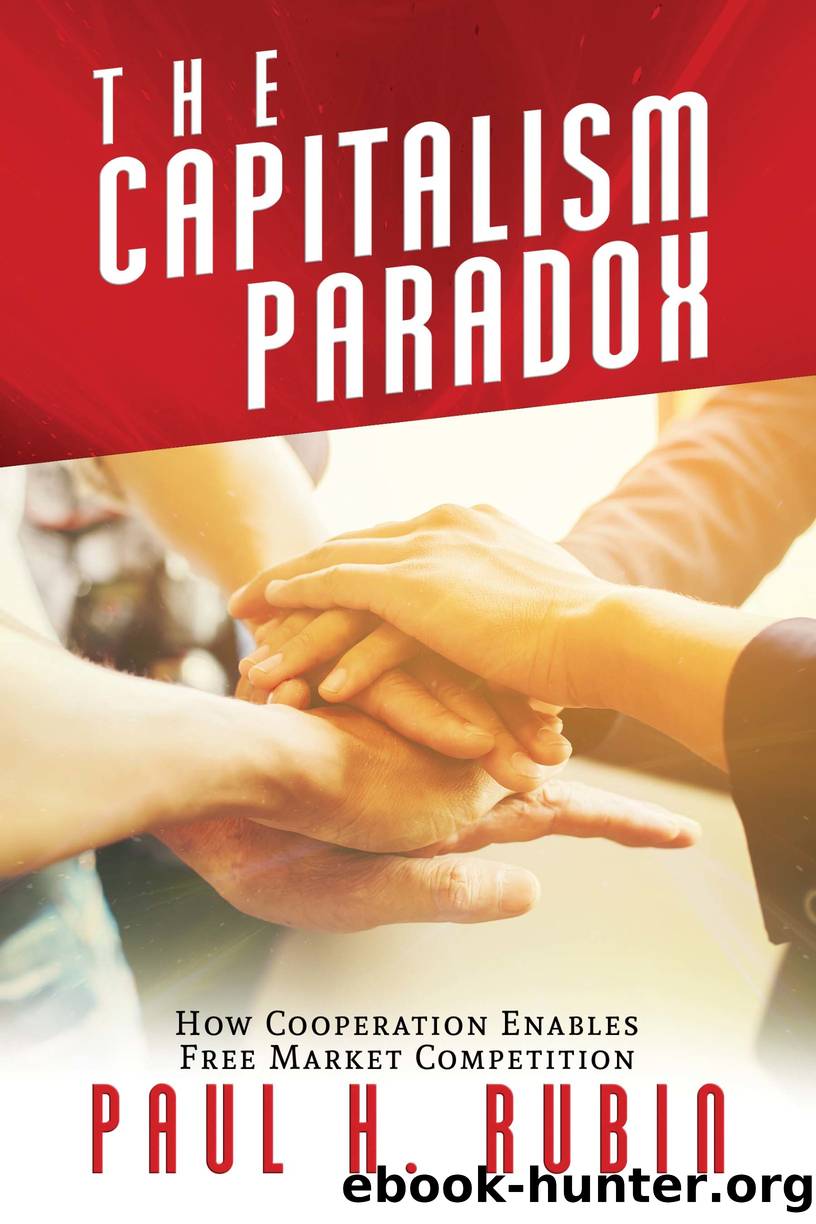The Capitalism Paradox by Paul H. Rubin

Author:Paul H. Rubin
Language: eng
Format: epub
Tags: N/A
Publisher: Post Hill Press
Published: 2019-05-23T00:00:00+00:00
CHAPTER 4
COMPETITION
One of the main points I want to make in this chapter is that the way in which economists use the term âcompetitionâ is different from the way that noneconomists use the term and that this difference leads to a lot of mischief. But before I begin this analysis, I want to make two different points. I want to discuss the fundamental nature of competition and the importance of competition.
We think of firms competing with other firms. Firms want to sell more, or gain market share, or put their rivals out of business. On the buying side, firms want to hire the best workers or gain access to the best sources of supply.
But here is the important point: To the extent that firms are competing, they are competing for the right to cooperate. If a firm wants to sell more than its rivals, this means that it wants to cooperate with more consumers. If it wants to hire the best workers, that means that it wants to cooperate with those workers. If it offers better terms (say, lower prices) than its competitors, it does so to gain more consumers with whom to cooperate, and the ultimate benefit of this competition goes to the consumers. As a leading marketing text describes the process, âBuilding profitable customer relationships requires satisfying target consumer needs better than competitors doâ (Kotler and Armstrong, 2010, p. 547).
We often lose sight of this important truth. We may focus on the âcompetitive battleâ between two firms because tales of such competition and rivalry are often exciting. Newspapers, business magazines, and books report these stories as if they are war stories. As we see below, when economists discuss oligopoly (a market structure with a âfewâ firms), they also focus on the interaction between those firms. But in all cases, the ultimate target of the competition and the ultimate beneficiary is the consumer.
Second, let us consider the importance of competition. We often hear praise of the competitive economy or of free competition. Economists, and particularly free market economists such as myself, are fond of statements of this sort, as are many pro-market politicians and newscasters. This is correct: competition, and particularly free competition, is very important to an economy. But only one part of the competitive process is actually beneficial. That is the right of free entry into a market. As long as entry is free, then we will achieve all the benefits of competition.
Competition is not the purpose of an economy. Competition is a tool. To the extent that we can say that the economy has a purpose, the purpose or goal of an economy is cooperation through exchange: transactions. Transactions are what lead to the benefits of the market. Benefits are realized when goods move to higher-valued uses or when both parties gain from some exchange. Competition through free entry is a tool that leads to the most efficient set of exchanges and maximizes the benefits of the exchanges, but it is the process of exchange that generates the benefits of the market.
Download
This site does not store any files on its server. We only index and link to content provided by other sites. Please contact the content providers to delete copyright contents if any and email us, we'll remove relevant links or contents immediately.
International Integration of the Brazilian Economy by Elias C. Grivoyannis(57285)
The Radium Girls by Kate Moore(10901)
Turbulence by E. J. Noyes(7032)
Nudge - Improving Decisions about Health, Wealth, and Happiness by Thaler Sunstein(6629)
The Black Swan by Nassim Nicholas Taleb(6183)
Pioneering Portfolio Management by David F. Swensen(5599)
Rich Dad Poor Dad by Robert T. Kiyosaki(5140)
Zero to One by Peter Thiel(4817)
Man-made Catastrophes and Risk Information Concealment by Dmitry Chernov & Didier Sornette(4728)
Secrecy World by Jake Bernstein(3773)
Millionaire: The Philanderer, Gambler, and Duelist Who Invented Modern Finance by Janet Gleeson(3565)
Skin in the Game by Nassim Nicholas Taleb(3456)
The Age of Surveillance Capitalism by Shoshana Zuboff(3411)
The Money Culture by Michael Lewis(3276)
Skin in the Game: Hidden Asymmetries in Daily Life by Nassim Nicholas Taleb(3259)
Bullshit Jobs by David Graeber(3172)
The Dhandho Investor by Mohnish Pabrai(3161)
The Wisdom of Finance by Mihir Desai(3069)
Blockchain Basics by Daniel Drescher(2884)
